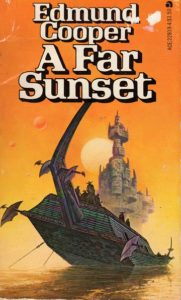Book Review: A Far Sunset by Edmund Cooper
Paul Marlowe is apparently the last survivor of the Gloria Mundi, a starship commissioned by the United States of Europe to explore the Altair star system. The fifth planet of Altair turned out to be inhabitable and inhabited by humanoid aliens, but the crew of the Gloria Mundi vanished in clumps. Marlowe and the remaining members were captured by the native Bayani, and while they were held, the ship self-destructed as a security measure.
Now known as Poul Mer Lo, the stranded Earthman must find a way to survive in an alien civilization, and find a new purpose in life. He has many ideas he could use to uplift the primitive Bayani, but his attempt to introduce the wheel results in 137 deaths, and Enka Ne, the god-king who has tolerated Poul Mer Lo’s presence, is soon to pass on.
Paul Marlowe must gamble everything he has left on an expedition to the Temple of the White Darkness, seat of the god Oruri. Are the secrets there worth the cost?
This 1967 novel posits the use of cryogenic suspension to make starships viable by 2012 (and also to treat mental illness!) The Americans and Russians (_not_ the Soviet Union, despite naming their ship the Red October) launch their own expeditions, which are irrelevant except for spurring the USE to put together the Gloria Mundi. Germany, France, Britain, Italy, Sweden and the Netherlands each contribute a married couple to the crew; psychologist Paul marries medical doctor Ann as an arrangement so they’ll be eligible. Hilariously, the wedding is broadcast on Eurovision.
During their waking times on the twenty-year voyage, Paul and Ann get along okay, but Paul never falls in love with her. That, and his belief that he is now a widower, means that Poul Mer Lo doesn’t feel terribly guilty about availing himself of the services of Mylai Tui, a former temple prostitute assigned by Enka Ne to be his servant. For her part, Mylai Tui mentions more than once how impressed she is with her master’s large thanu, and wants to bear his child to prove her worthiness.
The narrative smacks more than a little of colonialism, with the cultured Englishman stranded among dark-skinned natives who desperately need uplifting by his superior technological and cultural knowledge. He even assumes a position of power in their government by the end. By comparison, the sexism is downright subtle; Mylai Tui’s character arc is far more about “native servant worships English master” than about “woman is subservient to man.”
The highlight of the book is the perilous voyage to the Temple of the White Darkness, and Marlowe’s meeting with Oruri. It turns out Earth is not the first planet to send expeditions to Altair Five, and reading between the lines, the destruction of Atlantis might have been the best thing that ever happened to the human race. This section is exciting and full of wonder.
While the book is not badly written, it’s not well written enough to overcome the colonialist attitudes embedded in the narrative; I would not recommend it except to someone who’s studying pro-colonialist literature in speculative fiction.

